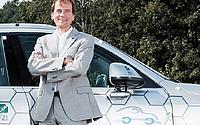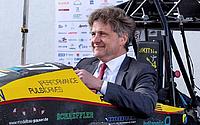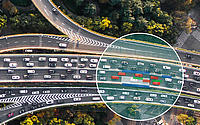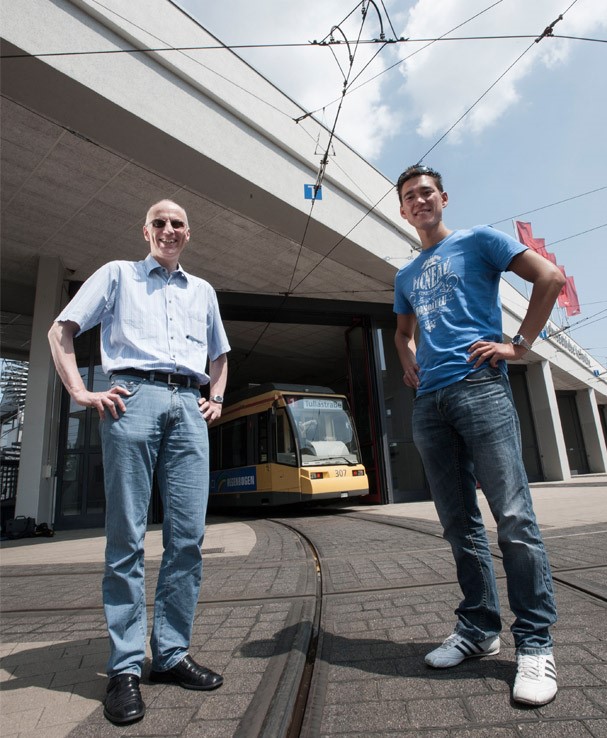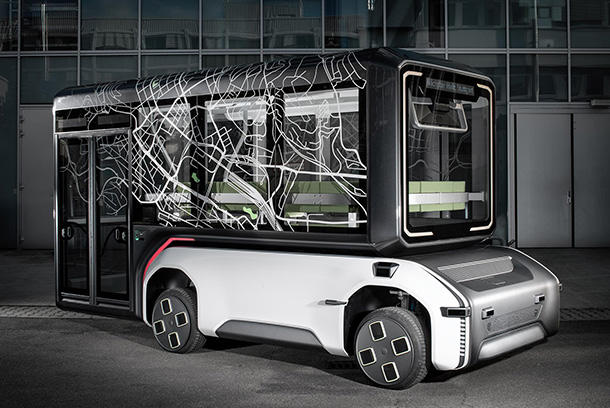Together with his research team and regional partners, Prof. Frank Gauterin is shaping the autonomous future of automobility by testing the vision of autonomous driving.
Practically everyone has experienced it: you get into a car accident through no fault of your own. According to the German Federal Statistical Office, around 2.5 million accidents occur on German roads every year. One of the main reasons for these accidents is human error of the person causing the accident, such as inattention, incorrect driving behavior or inability to react due to acute health problems. Over the years, the automotive industry has developed technical solutions to prevent accidents or at least minimize the consequences of accidents: from seat belts and crumple zones to electronic stability systems and parking sensors to automated brake support or distance control. Despite sophisticated assistance systems, accident statistics have been stagnating for several years, and the number of accidents is not declining any further. This is where technology reaches its limits, because the human behind the wheel remains as an uncertainty factor.
"Instead of relying solely on humans, vehicles – cars, buses, trains and commercial vehicles – will talk to each other. Not only with each other, but also with the entire infrastructure. Such machine communication will ultimately ensure greater road safety, less congestion and more energy-efficient driving." This is the image Prof. Frank Gauterin, head of the Institute of Vehicle Technology at KIT, has in mind for the mobile future. He uses it to describe the basic idea of autonomous driving, in which a vehicle collects data about its surroundings, exchanges it with other automobiles and makes self-determined driving decisions based on the data collection. An unsettling future scenario for some, but an undisputed evolution of mobility for others. This is not just about automated control of a vehicle, it rather means rethinking many areas of everyday life where traffic or transportation plays a role.
In local public transport, transportation and delivery or parking services, there are already many ideas on how autonomous, automated driving could be used to improve things. Conceivable examples include autonomous minibuses from the last stop of the regular service to one's own front door, automated overnight parcel delivery or self-initiated refueling of electric cars, if the battery level is low. But what’s the effort about good ideas on paper if you can't try them under real conditions – especially in a subject that many people still refuse to trust. The highways around Karlsruhe, but also the inner-city traffic axes, are known for their high traffic volume and are thus virtually a hotspot for accident risk. In combination with the urban structures of the city, Karlsruhe becomes the place where Prof. Gauterin's ideas go from paper to reality. Together with his research team and regional partners from research, cities and business, the consortium was given the unique opportunity to set up an extensive test field. The region from Karlsruhe to Bruchsal to Heilbronn was selected by the state as a pioneer region for autonomous driving: "In the test field for Autonomous Driving Baden-Wuerttemberg project, we are working together on technical solutions, an intelligent infrastructure and new mobility concepts under real conditions," explains Prof. Gauterin.
The entire test field covers inner-city areas, routes outside the city as well as expressways, tunnel roads and highways in the area from Karlsruhe via Bruchsal to Heilbronn. Once the test field has been successfully set up by 2018, it will also be open as a contact point for established companies and young start-ups - new technologies and business models can be tested on a living system. "The aim is not only to improve and test vehicles, but also to further develop the entire mobility system - from the technical infrastructure to local public transport and new logistics concepts."
However, Prof. Gauterin takes a realistic view: "The switch to automated driving will not take place overnight – It will be a gradual development for which not all technical issues have been resolved yet. With the Karlsruhe test field, however, we have the opportunity to prepare innovations," affirms Prof. Gauterin.
"By setting up and operating the Autonomous Driving test field, we can make a significant contribution to the mobility of the future. Mobility needs intelligent, environmentally friendly and social solutions. The region from Karlsruhe to Bruchsal to Heilbronn offers the best conditions for their development."
Pioneers in the test field for autonomous driving
Since 2016, the state of Baden-Wuerttemberg has been funding the test field for autonomous driving with 2.5 million euros. The project consortium consists of the cities of Karlsruhe, Bruchsal and Heilbronn as well as the research institutions FZI Forschungszentrum Informatik at KIT (consortium leader), Karlsruhe Institute of Technology (KIT), Karlsruhe University of Applied Sciences, Fraunhofer Institute of Optronics, System Technologies and Image Exploitation (IOSB) and Heilbronn University. The goal of all partners is to have the test field up and running by the end of 2017 and it is being supported by a large number of partners from industry and science in Baden-Wuerttemberg and beyond. The operation with security control center, IT administration, sales, accounting and controlling is made possible by the Karlsruher Verkehrsverbund (KVV) as an external and neutral operating company. The consortium itself and the partners are also contributing their own funds of around 4.2 million euros to the project.
Further links
Images: KIT

